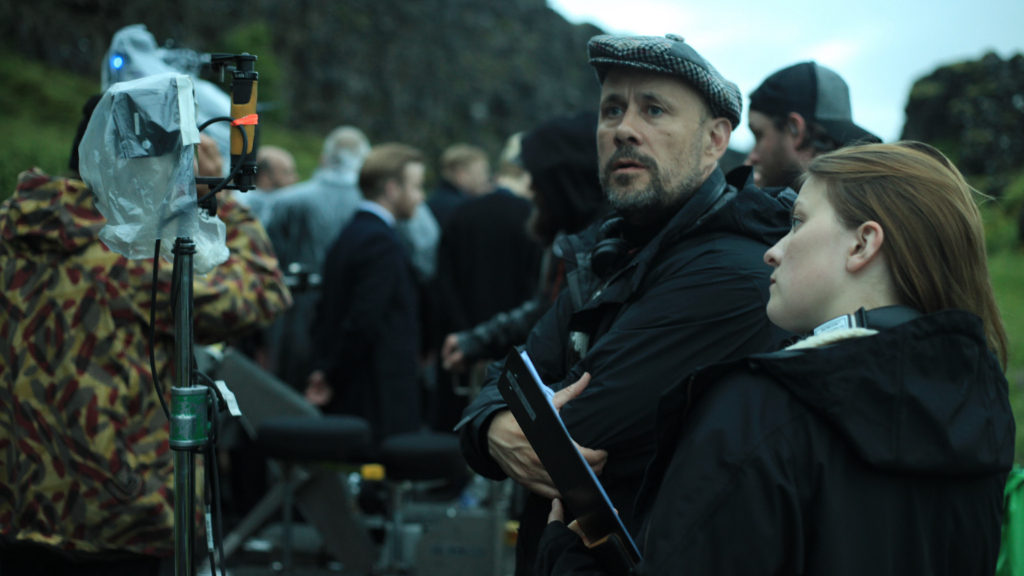“I wanted to make a film that tries to save the world”: An interview with Woman at War director Benedikt Erlingsson

Icelandic director Benedikt Erlingsson offers up his second feature film, Woman at War. The politically driven comedy-action movie follows a 50-year-old female eco-warrior called Halla who embarks on a mission against the Aluminium factory in Iceland whilst faced with the dilemma of whether to adopt a little girl from Ukraine.
Imparting social messages on climate change and positive activism, Erlingsson talks to us about his personal journey as he made the film, the obvious choice of a female lead and the environmental responsibility we each need to have.
How did you navigate the casting process, in particular your choice of the actress who plays Halla?
It was a long journey towards an obvious conclusion. Halldóra Geirharðsdóttir is a childhood friend and a fantastic actress. She still had to do an audition though – she was very offended! She still reminds me of it today, so it’s an ongoing punishment I endure!
What was your initial inspiration for the film?
The idea for this feature comes from many places but I wanted to make a film that tries to save the world. Then I thought about the hero that could save the world. Then you start to think about action films. Some things, in essence, are a fairytale. It became my mission to tell a tale of complicated and pressing issues, an apocalyptic scenario that really needs a storyteller to tell it.
Were you ever fearful of thrusting a woman to the forefront as a sort of “action hero”?
No, it came naturally. Women are always saving the world. Mine were; they were saving it from my birth! Especially when it comes to the environment, the women are very often at the forefront. So, it seems the right choice when making a film about an eco-sabotager (someone who crosses the line and sacrifices everything) to have a female lead.
How did you keep that fine line between Halla being seen as an eco-warrior as opposed to a terrorist?
This was one of the main concepts of the film: how easily environmentalists can be called terrorists and then how you define the word terrorist. Our hero claims she is a “sabotager”. Someone who doesn’t use violence, but who deliberately destroys things and properties, without harming people. She has the same principles as her heroes: Ghandi, with economic boycotts and strikes; and Mandela, who went further, blowing down infrastructures in South Africa with a jail sentence for treason and sabotage. There is a very clear line I think. With terrorism, you have to be like Truman, throwing a nuclear bomb on innocent people until you push somebody into submission. But I guess some people will see still see her as a terrorist.
Climate change is an obvious thread through the film. How important is this topic to you, and how did you manage to translate this into your story without shaming your audience?
Very important. For me, it’s a very bright future, a fantastic time to be a part of a generation to make a historic change, to save the world, reshaping our infrastructures, and making it not just a consumer issue but the producer too. We do need politicians to step up; I can only think of one leading the fight, Greta Thunberg. A 16-year-old girl. Of course, it’s easy to look away, but this film is hopeful with good material in a feel-good action movie.
For such a poignant film, there is a distinct absence of sex, violence or death. Was this your intention?
It’s intentional but in an unconscious way. I hate violence or crime and I’m sensitive to sex scenes – my dad would always sing over them to distract me! It can seem very unrealistic to add them to the natural storyline of this film.
Can you explain a bit about the musical interludes from the vocal trio and the oompah band and how they help create and move the story along?
It is a device to help visualise the inner conflicts of the country. We have this homage to a Greek choir that tries to influence the actions of the main protagonist and so yes, the music is basically a theatrical device.
Halla swings between the dilemma of adopting a child and saving the planet. Did you see this as a choice?
Yes, absolutely. We have this metaphor, “By saving one child, you have saved the world”, but you see, we have to save the world now – otherwise, there will be no world for our children!
By creating this film, has it opened your eyes up to these important environmental issues more?
Yes, for me it was an education. I was shocked the more I learnt about climate change, and how much the politicians are not saying, which is why our hero was against the establishments. It has been said that it only takes 3.5% of the population to be really engaged to turn the tide and make a mass movement.
Do you have any future projects on the horizon?
I think if I make another film, it will not have high stakes like this. It will be a different concept. I’m on my way to my next project. [Jokingly] It will be a romantic comedy!
Ezelle Alblas
Woman at War is released in select cinemas on 3rd May 2019. Read our review here.
Watch the trailer for Woman at War here:























Facebook
Twitter
Instagram
YouTube
RSS